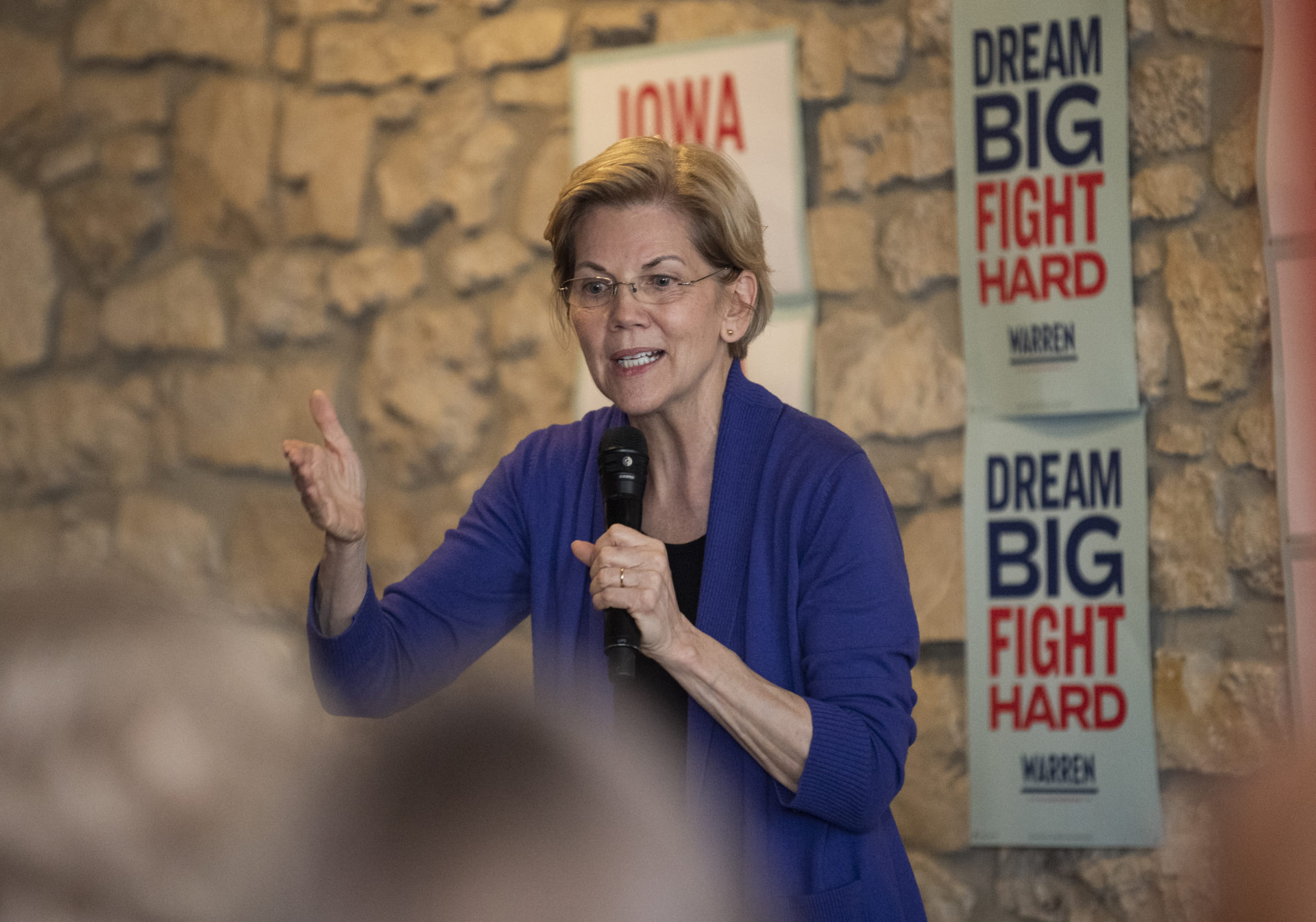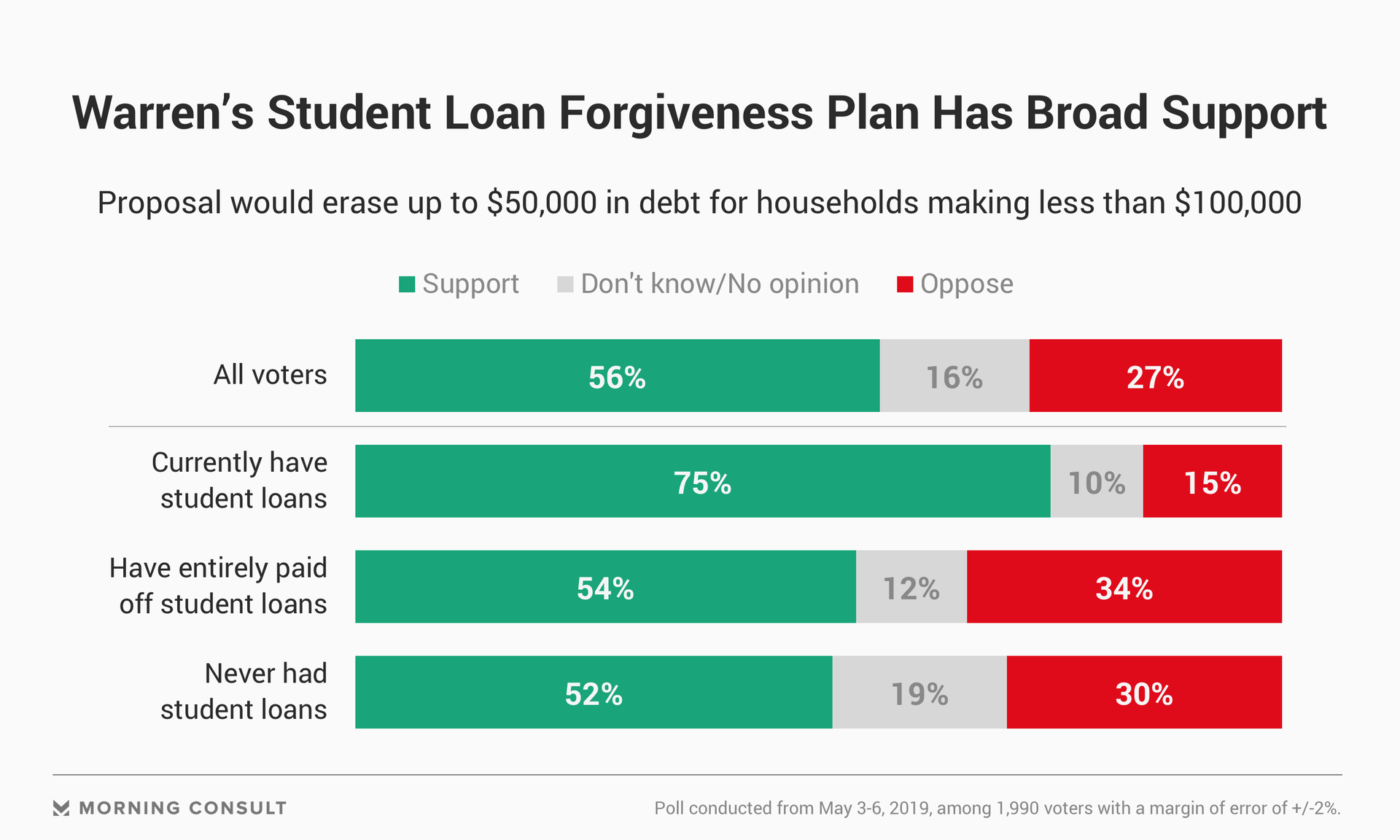Voters Favor Warren’s Student Debt Plan -- Including Those Who Never Had Such Loans

Key Takeaways
56% of voters back Warren’s plan.
Even 52% of voters who have never taken out a student loan say they would support the debt forgiveness proposal.
With her student debt forgiveness proposal, Sen. Elizabeth Warren (D-Mass.) has hit on another popular policy ahead of the 2020 presidential race.
Fifty-six percent of registered voters support Warren’s student loan debt forgiveness plan, according to a recent Morning Consult/Politico survey. The poll surveyed 1,990 registered voters from May 3-6 and carries a 2-point margin of error.
Warren's plan would cancel up to $50,000 in student loan debt for every person with household income under $100,000. The proposal would also make public colleges tuition-free and use Warren’s wealth tax -- a 2 percent annual tax on households with $50 million in wealth and a 3 percent tax on income over $1 billion -- to pay for its $1.25 trillion price tag over 10 years.

The student debt forgiveness proposal is popular even among voters who have never taken out student loans. A majority (52 percent) said they support the debt forgiveness plan, while 30 percent say they oppose it.
Voters who currently have student loans are the strongest supporters of Warren’s proposal, with 75 percent backing it and 15 percent opposing.
Those who have paid off their student loans are the most likely to oppose the plan at 34 percent. A majority (54 percent) still said they would support the proposal.
Democrats support the proposal more broadly at 77 percent compared to 11 percent who oppose it. A 47 percent plurality of Republicans oppose the plan, while 38 percent said they are in favor.
The other plank of Warren’s proposal -- free public college tuition -- had similar levels of support. Fifty-five percent of registered voters backed the plan, while 30 percent opposed it.
Warren’s student loan proposal isn’t the first widely popular economic plan the 2020 Democratic presidential candidate has suggested this election cycle. Her wealth tax garnered 61 percent support among voters in a previous Morning Consult/Politico poll, including backing from 74 percent of Democrats and 50 percent of Republicans.
Overall, Democrats in Congress could have an edge on Republicans on education: 46 percent of all voters said they trust congressional Democrats to handle the issue compared to 31 percent who said they trust congressional Republicans, according to the survey.
In a previous poll, 44 percent of voters said student loan debt poses a major threat to the United States, and an additional 36 percent said it poses a minor threat. Only 10 percent said it’s not a problem at all. That poll surveyed 1,995 voters from April 28-29 and has a margin of error of 2 percentage points.
Other Democratic candidates have sought to address the nearly $1.5 trillion student debt load leading up to the 2020 presidential election. Sens. Cory Booker (D-N.J.), Kirsten Gillibrand (D-N.Y.) and Kamala Harris (D-Calif.) have signed on as co-sponsors to Sen. Brian Schatz’s (D-Hawaii) debt-free college bill. Presidential candidate and South Bend, Ind., Mayor Pete Buttigieg said he supports expanding Pell Grants and incentivizing more state spending on higher education, but stopped short of backing free public college.
Democratic presidential frontrunner and former Vice President Joe Biden hasn’t offered any definitive plan regarding free college or student loan forgiveness. In 2017, Sen. Bernie Sanders (I-Vt.) introduced a bill that would make public college free for students from families earning $125,000 or less and community college free for everyone.
Claire Williams previously worked at Morning Consult as a reporter covering finances.